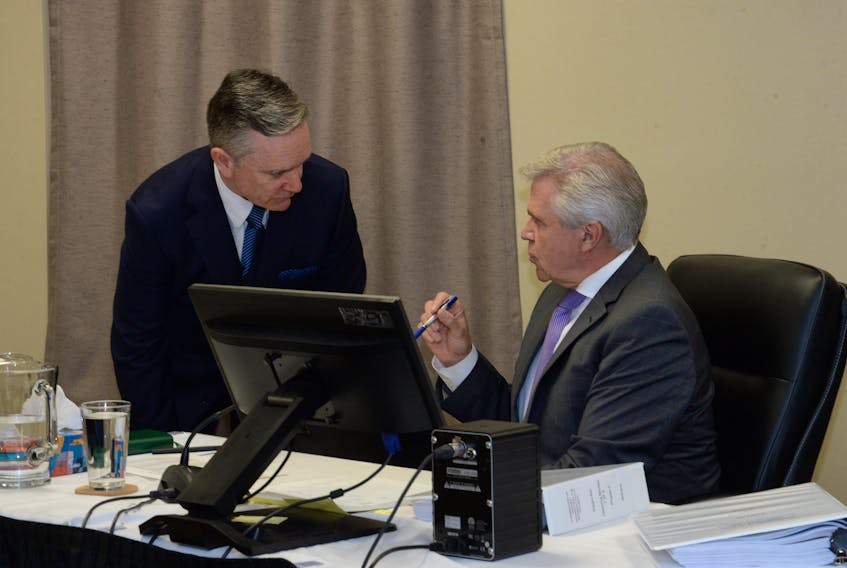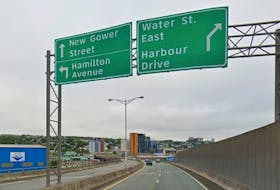ST. JOHN'S, N.L. — Premier Dwight Ball is not ruling out the Muskrat Falls project being viewed in a favourable light at some point in the future. He just can’t go there right now.
He says he’s too busy, trying to figure out how to handle cost overruns and keep power rates from skyrocketing and crippling the economy.
He talked about his broad view of the hydroelectric megaproject before finishing up as a witness at the ongoing Muskrat Falls Inquiry on Friday. He was responding to questions from Tom Williams, who represents a collection of former Progressive Conservative government members, including former premiers Danny Williams, Tom Marshall and Paul Davis.
Ball suggested the province as a whole has been trying to understand what happened.
“I think every single Newfoundlander and Labradorian would want to see this (project) to be successful. Unfortunately, what I have to deal with, the potential of what would have been doubling of electricity rates without mitigation, which was not what we were told. We were told the project would be $6.2 billion, we’re at $12.7 billion,” he said.
The $6.2-billion figure was commonly cited in 2012, when the project was green lit. It was a capital cost estimate only. The $12.7-billion estimate is current, and includes cost increases since sanctioning, plus financing and interest. It does not include the cost of the Maritime Link with Nova Scotia.
“We didn’t start out, I didn’t start out, to celebrate the failure of the project. I wanted this to be successful. And in the long term, I still want it to be successful, but we have to deal with the next 10 years, with a rate mitigation program that will be subsidized primarily by dividends from Nalcor, a little over $2 billion. So this is far from over,” the premier said.
Ball said he sees promise in economic development efforts. He called himself one of the most optimistic people in the hearing room, but he is also facing hard reality in immediate, difficult financial demands.
“And even though in the long term there might be benefits from this project — I hope there is — but in the short term we still have a lot of money that will need to be injected into this project, to keep rates affordable and to keep this province to a point where we can actually compete and attract business here. This is what I’m dealing with,” he said.
The Liberals are waiting for the recommendations of the inquiry, but also a final report from the Public Utilities Board, with its separate investigation into rate mitigation (with public hearings expected in the fall). The plan for rate mitigation will then be finalized, before the full costs of Muskrat Falls hit.
Before the inquiry session ended — and the second phase of the inquiry concluded — Commissioner Richard LeBlanc issued a request to the premier. It was relevant to present day, but also the future of how Muskrat Falls-related costs are determined and forwarded to ratepayers.
LeBlanc highlighted the fact ongoing costs tied to the Muskrat Falls project (including maintenance and operating costs) are stated by Nalcor Energy and then reviewed by Canada’s independent engineer, before they get added to the public power bill. But it’s not the same as a regulated utility having planned spending challenged by an independent body like the Public Utilities Board (PUB).
“While there may presently be no ability to have oversight or review by the Public Utilities Board as a result of the exemption order (tied to project financial arrangements), at the very least you are in discussions with Canada on the federal loan guarantee and I believe that, my suggestion would be (…) my recommendation would be that this is an area that perhaps you should consider having your officials look at and also to discuss with Canada,” he said to Ball.
“Again, I’m not suggesting any malfeasance by anyone, but I do believe the ratepayer of the province deserves some form of oversight with regard to the calculation of those costs that are basically going to form that (guaranteed) stream of revenue,” he said.
Ball said he appreciated the point and it is something he’s thought about.
The inquiry is not quite finished. A third phase is scheduled, but is far shorter than the extensive review of construction in Phase 2. There will be two public consultation sessions in addition to the regular hearings before the inquiry is over, with the ending marked by a return to Happy Valley-Goose Bay in early August for final submissions. A full schedule, subject to change, is available online.
RELATED









